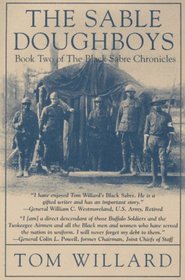Helpful Score: 1
I admit to being a bit disappointed with this book. I didn't get it through PBS, but snapped it up at a local thrift store. As a result, I didn't examine the book's description properly. I thought it was another history of the Afro-American doughboys of World War I. But it turned out to be a novel.
As a former Marine, I have great admiration for what the Afro-American doughboys accomplished in France. But I felt this novel didn't do them justice. If it had been a Western, I could call it a B-Western. It seemed more like a compilation of vignettes than a story. And while I know a fiction writer can use "literary license," some of the mistakes in the book were inexcusable, at least to me.
For example, the author has a white corporal who instructs the black officer candidates, and who gives them a hard time due to their race, finally do a favor for one of the officer candidates. When he is asked why, he says that Captain Charles Young---who was the last black American to graduate from West Point before Benjamin Davis, who was later the first black general in the U.S. Army--risked his life to save the corporal in an action against the Sioux in 1887. Unfortunately, this was two years before Second Lieutenant Young even graduated from West Point. It would have been easy for the author to just jump the incident forward a few years to make it coincide more with real history.
This may seem like a minor point to you, but, as an student of history, I felt it detracted somewhat from the book. If you want to teach the inspiring story of our Afro-American soldiers, do it properly!
The worst part is I also have "Buffalo Soldiers," the prequel to this book, on my TBR list. I also thought that was a history book too. So I won't be in any hurry to read it.
As a former Marine, I have great admiration for what the Afro-American doughboys accomplished in France. But I felt this novel didn't do them justice. If it had been a Western, I could call it a B-Western. It seemed more like a compilation of vignettes than a story. And while I know a fiction writer can use "literary license," some of the mistakes in the book were inexcusable, at least to me.
For example, the author has a white corporal who instructs the black officer candidates, and who gives them a hard time due to their race, finally do a favor for one of the officer candidates. When he is asked why, he says that Captain Charles Young---who was the last black American to graduate from West Point before Benjamin Davis, who was later the first black general in the U.S. Army--risked his life to save the corporal in an action against the Sioux in 1887. Unfortunately, this was two years before Second Lieutenant Young even graduated from West Point. It would have been easy for the author to just jump the incident forward a few years to make it coincide more with real history.
This may seem like a minor point to you, but, as an student of history, I felt it detracted somewhat from the book. If you want to teach the inspiring story of our Afro-American soldiers, do it properly!
The worst part is I also have "Buffalo Soldiers," the prequel to this book, on my TBR list. I also thought that was a history book too. So I won't be in any hurry to read it.





